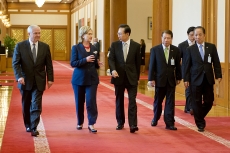The CPD Blog is intended to stimulate dialog among scholars and practitioners from around the world in the public diplomacy sphere. The opinions represented here are the authors' own and do not necessarily reflect CPD's views. For blogger guidelines, click here.

The Madam Wears Pant Suits
APDS Blogger: Alex Laverty
Summertime is always an excellent time to reflect, recharge and catch up on the books you’ve been meaning to read for longer than you can remember. My reading list this summer is longer than in years past due to the sheer volume of new work critical to those in the global engagement, corporate diplomacy and public diplomacy spheres. It could be that this is due to a pervasive feeling of discontent and urgency – where ideas are formed, issues collide, and independent action has a new meaning and consequence for peoples around the globe.
It is the summer of 2012 and America is debating whether to modernize a piece of 1948 legislation on U.S. public diplomacy called the Smith-Mundt Act. At a time when American officials are racing to keep pace with the new communication technologies and trying to “out-communicate” the terrorists, not just other nations, the whole debate is mind-boggling. Ultimately, the debate is about much more than the legislation and speaks volumes about America understanding of communication in a global era. To get up to speed, U.S. public diplomacy needs the U.S. public, and both need a U.S.
SIMI VALLEY, CALIFORNIA --- The Ronald Reagan Presidential Library is a lovely memorial on a hill, overlooking many miles of California countryside. It also hosts thoughtful discussions about Reagan’s legacy, including a recent one that marked the thirtieth anniversary of his speech to the British Parliament – the “Westminster speech” – in which he proposed an assertive future for builders of democracy.
Greetings from Washington. Along with the warmer temperatures and afternoon summer thunderstorms, a firestorm has erupted over a Congressional amendment related to U.S. public diplomacy. I put this post under Culture Posts, because the ferocity of the debate has had little to do with the technical aspects or merits of the legislation itself. At stake, and what the argument was really about, were iconic American values. The debate also reveals a surprising lack of understanding about just what is public diplomacy in the modern era of global communication.
Facebook is Zimbabwe’s top website. According to Google, Facebook was the most popular web search term among Zimbabweans in 2011, replacing “Zimbabwe,” which led the list in 2010 and 2009. The Zimbabwe Broadcasting Corporation’s (ZBC) Power FM, despite its antiquated broadcasting studios, fills its popular music programming with trendy young DJs enthusiastically pushing listeners to follow them on the social networking site while quoting recent FB comments.
Pages
Visit CPD's Online Library
Explore CPD's vast online database featuring the latest books, articles, speeches and information on international organizations dedicated to public diplomacy.
POPULAR ARTICLES
-
March 22
-
April 11
-
April 1
-
March 4
-
March 19
Featured Blogger
Join the Conversation
Interested in contributing to the CPD Blog? We welcome your posts. Read our guidelines and find out how you can submit blogs and photo essays >.








